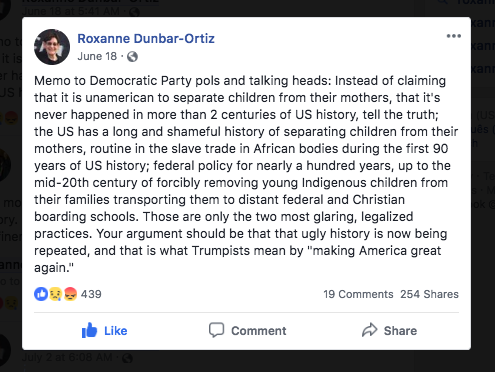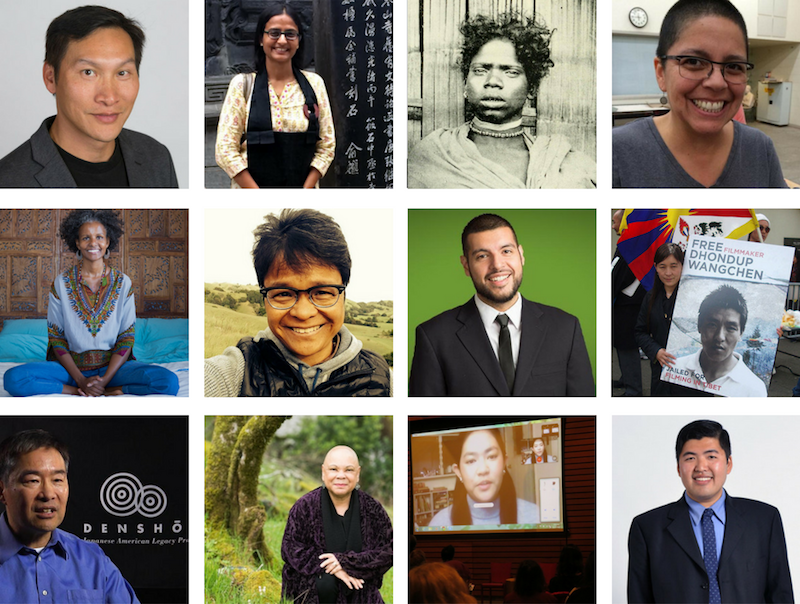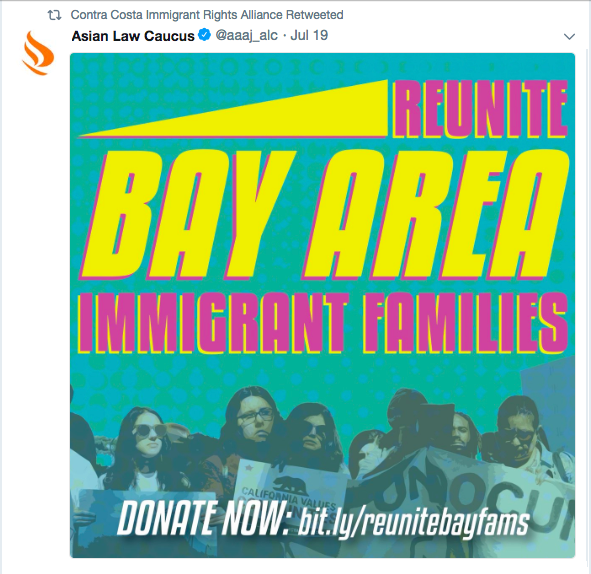Reunite Immigrant Families: 5 Actions, 5 Buddhist Remembrances

All that is dear to me
and everyone I love
are of the nature to change.
There is no way to escape
being separated from them.
So goes the fourth of Five Remembrances in Buddhist teachings, in a version from Vietnamese Zen leader Thich Nhat Hanh. (Also found in the Upajjhatthana Sutta, Subjects for Contemplation, in the Theravada traditions.)
There is no way to escape this fact of life.
But is this a fatalistic form of Buddhism, resigning us to blithely accept separation from those we love?
Resigning immigrant families to endure oppressive separation, torturing children in cages?
Resigning the U.S. — the biggest jailer in the world — to uphold this cruel facet of the prison industrial complex?
Not at all. No resignation here.


The Five Remembrances, rather than nudging us toward nihilism, remind us to flow with impermanence, rather than against it, to enhance our appreciation and understanding of the world.
Appreciation and understanding help us take action from a place of spiritual power, rather than fear and reactivity.
When we attach and rigidly fixate on the way we want the world to be, we waste energy wishing things were other than they are.
A better solution than resisting reality? Put that energy into "shaping change" — in the Earthseed philosophy of Black feminist sci-fi author Octavia Butler. Or, in Buddhist terms, invest in our "only true belongings": our actions.
As the fifth of the Five Remembrances says:
My actions are my only true belongings.
I cannot escape the consequences of my actions.
My actions are the ground upon which I stand, [sit, lie, and live.]
We will all one day be separated from those we love. Some are being separated more brutally than others. Rather than filling us with fear, let this truth renew our energy to cherish and protect the bonds that racist, oppressive systems are trying to tear asunder.
In the spirit of compassionate action, calling on courage and wisdom, here are 5 actions you can take in the collective movement to reunite immigrant children and their families. The list is by no means exhaustive, so please feel free to share your wisdom in comments.
With love, metta, and solidarity,
Katie Loncke
PS: for more to fortify you, check out Sanctuary: Spiritual Wisdom + Immigrant Justice — a 90-minute dialogue between Rev. Zenju Earthlyn Manuel and Eddy Zheng. Wisdom from formerly incarcerated leaders like Eddy might be some of the best medicine for these times.
5 Actions to Help Reunite
Immigrant Families
1. Support local actions in defense of immigrants.
Marches, noise demos, legal support, housing, amplifying voices on the inside — there might be a ton of local ways to get involved, if you're not already. Remember to
- Be patient, honoring both short-term and long-term effort
- Center those directly impacted in the struggle
- Listen and show up when called.

Art and Marches, Online and In the Streets
Political artist Micah Bazant contributed this poster and statement to the movement, earlier this month.
"New art made with so much love with Mijente for their huge #FreeOurFuture action… at the border in San Diego. 1000s are putting their bodies on the line to demand #AbolishICE!
I wanted to show the connections between prisons and detention/concentration/internment camps. I wanted to show a trans Latina mama protecting her child. I wanted to show how our freedom is rooted in the land and the seeds of our future. I have so much respect for Mijente's vision and their refusal to leave anyone behind. They are in the streets with BYP 100, Familia: Trans Queer Liberation Movement, DRUM - Desis Rising Up & Moving, Palestinian freedom fighters and so many others. If like me, you can't be in San Diego … lets amplify Mijente online!
Image description: painting of a trans Latina woman holding a young child. On her left is a prison behind a razor wire fence, on her right is a tent prison behind a razor fence. She is wearing a red skirt and a white blouse with red flowers. Large text at the bottom says Abolish ICE. Behind her head is a yellow background with radiating light yellow seeds, and large red text saying Free Our Future."
Hunger Strikes
Are ICE detainees in your area protesting their own captivity through hunger strikes? Keep a lookout for how you can support. Hunger strikes led by immigrant mothers and other ICE detainees are rolling across the country, from Texas to the Pacific Northwest.
Ongoing Walks and Encampments
BPFers in Portland, OR, have held a monthly interfaith walk around a local ICE building — a walk that paved the way for the country's very first encampment designed to block ICE operations. Portland successfully shut down an ICE facility for 8 consecutive days, drawing the attention and ire of Trump himself. Since then, encampments have sprung up across the nation, from Philadelphia to Louisville, Kentucky. If there's one in your town, there are likely tons of ways to pitch in, off-site or on-site. Investigate!
Grounding Planes / Refusing to Fly / Kicking ICE Off Of Buses
If you happen to be a pilot, bus driver, or other transit worker (or passenger) with the power to protect immigrants in your vehicle... Take courage from great examples, and do it! The Independent UK reports that "Pilots have stopped 222 deportations of asylum seekers from Germany by refusing to take off with them on board."
Resistance to White Nationalists
From Oakland to Washington DC, white supremacist rallies and xenophobic alt-right gatherings are on the rise. To join Buddhists mobilizing against a white supremacist rally in DC (Unite The Right II — Charlottesville Anniversary Event —August 12th), follow BPFer Annie Mahon's Facebook post for mindful meetup details.
2. Donate to help free parents in detention.
While politicians argue over the pragmatism of abolishing ICE, impacted people are illuminating what's needed right now. In some cases, what's needed is cash — to pay bonds and assist with expenses.
[Thanks to these donations], our community members will have the chance to return to their homes, jobs, families, and communities while they await their hearings. Families belong together in their communities where they can be safe and thrive, not separated from each other.
Know of other local funds to free family members? Please feel free to leave in comments.
Shoutout to recent precedent campaigns like National Black Mama's Bailout Day — using Mother's Day as a rallying call to collectively free Black mothers sitting in jail simply because they can't afford bail. Movements like this remind us that even as we take action for individual survival, we must also keep an eye toward abolishing systems (like money bail, and mass incarceration) altogether.
3. Study the long history of family separation in the U.S.
Native scholar Roxanne Dunbar-Ortiz, author of An Indigenous Peoples' History of the United States, is among the public intellectuals reminding us that family separation in the U.S. did not begin this year, or the last year, or the year before.
Foundations in African and Native American Oppression

Echoes in Japanese American Incarceration
Joining Dunbar-Ortiz in drawing on history to defend today's immigrants are voices like Tom Ikeda, executive director of Densho — an organization that documents World War II Japanese American incarceration history.

Although family separation did not happen in precisely the same way it's happening now, the cruel and traumatizing experience of racist mass incarceration for Japanese Americans (upheld by the Supreme Court's Korematsu decision of 1944) shows that 'keeping families together' behind bars is NOT the solution we want, either.
Tips for white Buddhists
Particularly for white folks in the Buddhist community looking for educational resources on the attack on immigrants, we recommend three great resources on a national level:
The Catalyst Project
Catalyst is a U.S.-based network of white folks (faithy and not) working to end white supremacy. In a recent curriculum and extensive online roundup of articles on attacks against immigrants, they cover a ton of ground and shout out a number of People-of-Color organizations doing good work.
White Awake
Founded specifically by white anti-racist Buddhists, White Awake's Facebook page features a lot on immigration these days, and their blog includes an interview with Zen priest Greg Snyder on assimilation, intimacy, and power.
North American Buddhist Alliance
NABA's White Affinities group is "a monthly space to talk about the work we're doing to end white supremacy and work for racial justice, whether that's in our sanghas, in the U.S. and beyond — what we are learning, what the challenges are, and how this connects with our Buddhist practice."
4. Honor fellow Buddhists, especially immigrant Buddhists and Buddhists of color, supporting migrant justice
Mudita (empathetic joy — one of the Four Brahmaviharas, or sublime attitudes in Buddhism) is one of my personal favorite activist practices for counteracting burnout. When I contemplate how many wonderful engaged buddhists I see in the U.S. working for the freedom, awakening, and evolution of society, I am filled with gratitude and wonder. Then, I reflect that the total collection of people I know is just a TINY DROP in the MASSIVE RIVER of Buddhist effort flowing toward freedom in occupied Turtle Island (the U.S.A.). Which in turn is a humble stream flowing into a GIANT OCEAN of compassionate engaged Buddhist action worldwide.
While this list of folks on my heart is nowhere near complete, I hope it sparks some wonder and encouragement for you, dear reader — knowing you are not alone!

Eddy Zheng, formerly incarcerated leader, 2015 Soros Fellow, Co-Director of the Asian Prisoner Support Committee, and featured in Buddhist Peace Fellowship's online curriculum, Sanctuary, is bringing his indomitable spirit to the resistance — drawing on Tai Chi practice, spiritual power, and his signature slogan, "Happy New Breath."
Kritee Kanko, Zen priest and climate scientist, bringing fierce compassion to Eco-Dharma work from India to Boulder, Colorado.
Maari Zwick, winner of a Buddhist Peace Fellowship Soma Award, co-founder of Dalit History Month, and Research Director at Equality Labs, is supporting Dalit communities in diaspora — including Buddhist followers of the late and legendary B. R. Ambedkar, one of the most famous modern Buddhists in India.
Antoinette Gonzalez, immigration rights attorney, is a BPF Block Build Be alum who draws on her dharma practice to maintain hope in the face of the crisis.
Sebene Selassie, an Insight dharma teacher born in Ethiopia and raised in Washington DC, just finished co-teaching a Cultural Spiritual Bypassing course at Barre Center for Buddhist Studies.
La Sarmiento, a gender non-conforming dharma teacher born in the Philippines and raised in the U.S., is Lead Teacher at Inward Bound Mindfulness Education (iBme), teaches mindfulness to teens.
Jose Ivan Arreola, Director of Genesis Healing Institute, is creating opportunities for holistic and traditional healing for immigrant and undocumented communities in order to rejuvenate and fortify their mental, emotional and spiritual well-being.
Dhondup Wangchen, former political prisoner and renowned filmmaker documenting Tibetan resistance, is helping Students for a Free Tibet mark the 10-year anniversary of the 2008 uprising and the Beijing Olympics campaign.
Densho, mentioned above in #4, is preserving histories of Japanese American WWII incarceration and linking them to current racist attacks on immigrant communities.
Ruth King, dharma teacher and author of Mindful of Race: Transforming Racism from the Inside Out, has been sharing songs of resistance "in honor of families being torn apart at the border" — songs created by Linda Villa Arce and Trente Morant for the forthcoming musical, "The Monarchs of Mexico."
Saddha: Buddhists for Peace, while working with and as Burmese-diasporic community, is keeping their focus squarely on the Rohingya refugees currently being massacred and persecuted in the Myanmar Buddhist-nationalist genocide.
Kuong Ly, a BPFer, Cambridge Human Rights Commissioner, and former Soros Fellow for New Americans, is working hard to protect the Cambodian community from deportations.
5. Breathe.

Dear one, these times are frightening. But like a pinecone that opens in fire, we too can open to life, even in crisis. The triple refuge of Buddha, dharma, and sangha are here to support us — especially in hard moments. As long as the breath in the body continues to flow, there is opportunity for awakening, and compassionate action.
Now might be a great time to maintain or deepen your own practice, traditions, prayer, faith, and wisdom trainings.
Maybe it's asking equanimous advice from dinosaurs. Maybe it's attending temple services more often. Maybe it's regrounding in a daily meditation practice. Maybe it's renewing your efforts to seek and build sangha — spiritual community.
Thank you for all you are doing and being, for collective liberation.
Together, with each mindful breath, may we live into paradox.
Loving the world as it is, and fighting to change it.
![A tweet from Resource Media reads: "We are proud to be supporting @NWIRP's work to free immigrant families being detained in Washington State. We invite our local friends and allies to join us in helping to #ReunifyWA. #FamiliesBelongTogether [link to donate]. A bright red, brown, and blue illustration shows a mother and child embracing, reading "Free Immigrant Families Fund."](http://static1.squarespace.com/static/62e05f56201d77165dcd527e/62e07b9bc815fe68f864c5b1/62e07bc1c815fe68f864db87/1658878913736/Screen-Shot-2018-07-23-at-8.51.16-PM.png?format=original)
